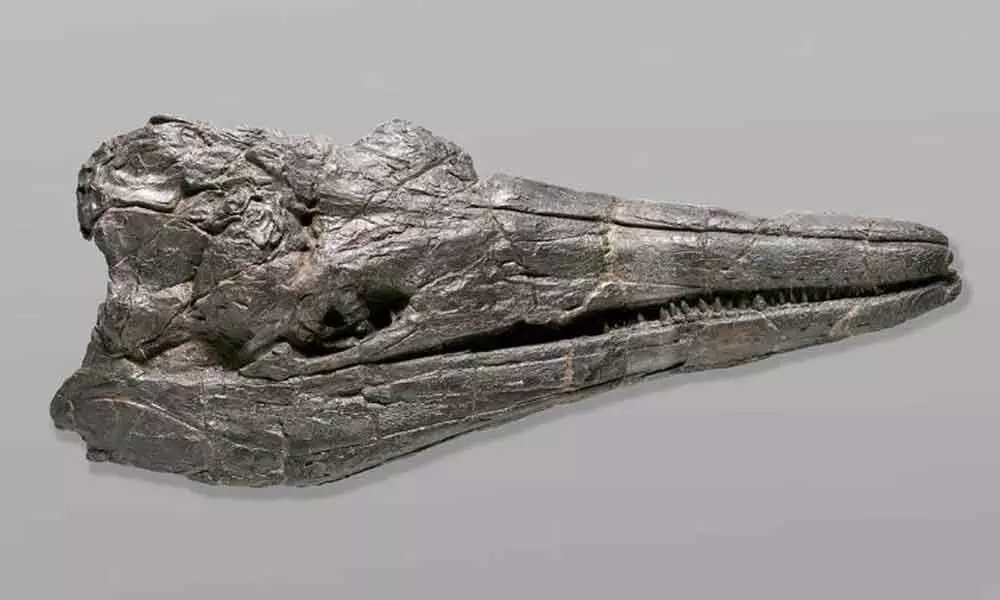Live
- They always want me to win, and now I feel lucky to have been offered a story like ‘Zebra’: Satyadev Kancharana
- ‘Democracy first, humanity first’: PM Modi in Guyana's parliament on two countries' similarities
- PKL Season 11: Telugu Titans register third straight win to top standings
- Is Pollution Contributing to Your COPD?
- NASA Unveils Underwater Robots for Exploring Jupiter's Moons
- Additional Central forces arrive in violence-hit Manipur
- AR Rahman and Saira Banu’s Divorce: Legal Insights into Common Issues in Bollywood Marriages
- 82.7 pc work completed in HPCL Rajasthan Refinery area: official
- Curfew relaxation extended in 5 Manipur districts on Friday
- Tab scam prompts Bengal govt to adopt caution over fund disbursement
Just In
Study Reveals That Ichthyosaur Was A Dinosaurian Ocean Behemoth


Study Reveals That Ichthyosaur Was A Dinosaurian Ocean Behemoth
- The foremost two- cadence measured cranium of species from the giant ichthyosaur shows about the marine reptiles'and their rapid-fire development into mammoths of the Dinosaurian abysses.
- The first shell findings in southern England and Germany over 250 times agone, these'fish-saurians'were between all the first large reactionary reptiles known natural, long before the dinosaurs.
The foremost two- cadence measured cranium of species from the giant ichthyosaur shows about the marine reptiles'and their rapid-fire development into mammoths of the Dinosaurian abysses. It'll help to assess the trip of ultramodern cetaceans similar as jumbos and dolphins to come the largest creatures to ever inhabit the Earth. The well- saved head, along with corridor of the backbone, shoulder, and fore fin, was discovered in the Augusta Mountains of Nevada and dates attributed to the Middle Triassic (247.2-237 million times agone), making it the foremost case of an ichthyosaur of grand proportions.
These'fish-saurians'were among the first large reactionary reptiles known to wisdom, long before the dinosaurs, and they've recorded the popular imagination. The first shell findings in southern England and Germany over 250 times agone, these'fish-saurians'were between all the first large reactionary reptiles known natural, long before the dinosaurs.
The lately named Cymbospondylus youngorum is the largest beast yet plant from that time period, on land or in the ocean, measuring further than 17 metres (55.78 ft) long. It was, in fact, the first known enormous species to ever inhabit the Earth.
Dr. Martin Sander, paleontologist at the University of Bonn and Research Associate with the Dinosaur Institute at the Natural History Museum of Los Angeles County (NHM) said that on the edge of the flume, just a many chines were exposed. The significance of the discovery wasn't incontinently apparent. The deconstruction of the chines, on the other hand, suggested that the beast's frontal end might still be buried beneath the jewels. The group demanded a warm-up one cool September day in 2011, so they tested this proposition by digging the head, pins, and casket region.
The species' rearmost picking,C. youngorum, celebrates a happy coexistence that the fieldwork was patronized by Great Basin Brewery of Reno, which is managed and operated by Tom and Bonda Young, the generators of the regionally notorious Harsh beer with an ichthyosaur on its marker.
C. youngorum floated the swell 246 million times agone, hardly three million times after the first ichthyosaurs got their fins wet, an incredibly short time to grow this large.C. youngorum's extended conk and conical teeth indicated that it chased squid and fish, but its size suggests it also hunted lower and juvenile marine reptiles.
Jumbos and ichthyosaurs have further in common than just size. They both surfaced after major demolitions and have analogous body layouts. Because of their similarities, they're scientifically applicable for relative exploration. The experimenters used a combination of computer modelling and classical palaeontology to probe how these marine creatures singly grew to record- breaking sizes.
Meanwhile, dinosaurs ruled the land, while ichthyosaurs and other submarine reptiles (that were not dinosaurs) ruled the waters, reaching comparably massive sizes and species variety. Ichthyosaurs floated the ancient abysses for virtually the whole Age of Dinosaurs, with their evolving fins and hydrodynamic body forms visible in both fish and jumbos.

© 2024 Hyderabad Media House Limited/The Hans India. All rights reserved. Powered by hocalwire.com






